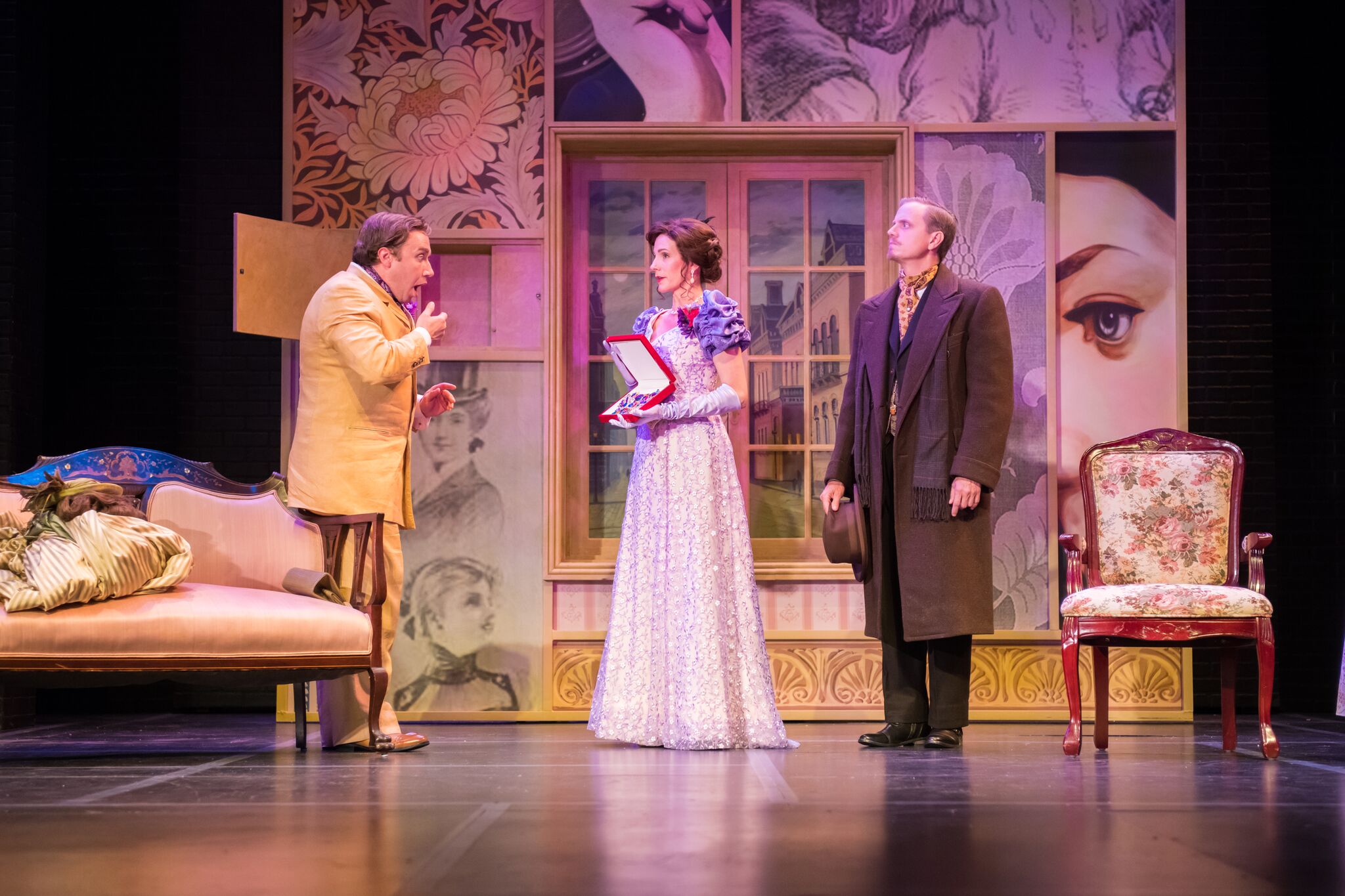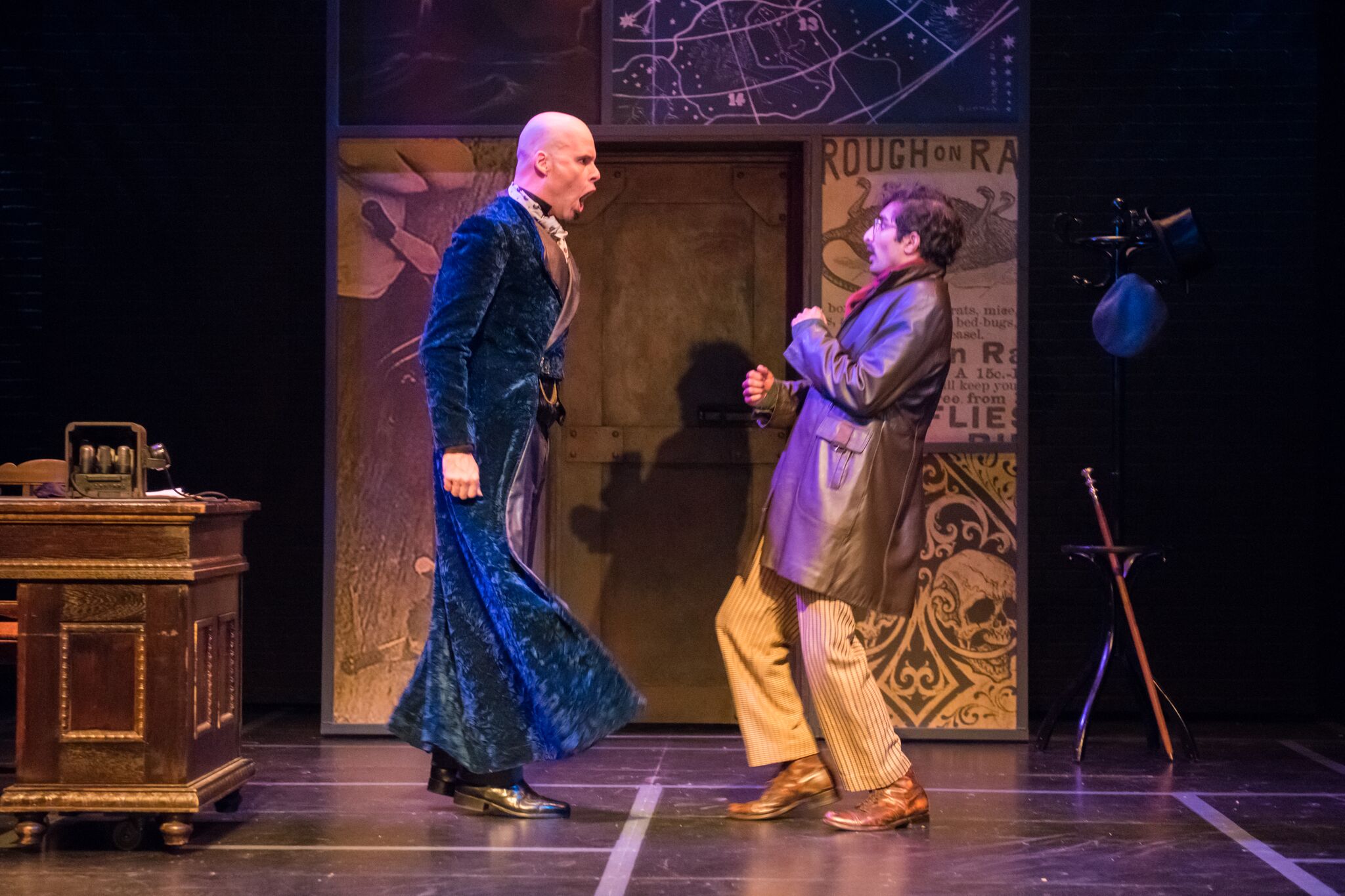Sherlock Holmes has a New Case -- At Milwaukee Chamber Theatre
Rick Pendzich as Oscar Wilde, Kay Allmand as Lillie Langtry and Ryan Schabach as Dr. Watson. Photo by Paul Ruffolo.
Now that the character of Sherlock Holmes is in the public domain, the peculiar genius detective is showing up with new stories across all forms of media. There are movies, comic books, TV series, books and new plays, including Jeffrey Hatcher’s “Holmes and Watson,” which was part of the Milwaukee Rep’s season last year, and a version for young audiences, “Sherlock Holmes: The Baker Street Irregulars” at First Stage Milwaukee in 2014.
Milwaukee Chamber Theatre has entered the Holmes fan club with their production of “Sherlock Holmes and the Case of the Jersey Lily,” playing through August 26 in the Cabot Theatre in the Broadway Theatre Center. With its familiar characters and clues, clever deductions and plot reversals, the play fits neatly into the genre of Victorian whodunits. But instead of building on the source material — including Conan Doyle’s novels, short stories and previous adaptations of his work; bits and pieces of Shakespeare plays; a Gilbert and Sullivan operetta; and a library full of Oscar Wilde plays, poems, witticisms and prose — playwright Katie Forgette mainly recycles them, but without Sherlock’s skill at puzzles and the wit of his friend Wilde. Fortunately the actors, designers and director Marcella Kearns raise the material as high as they can.
Alone in the study and itching for a new case to solve at the top of the play, Holmes (Brian J. Gill) and Watson (Ryan Schabach) are easily recognizable. The detective is restless, showing off the most mundane deductions while Watson is predictably amazed at his friend’s ability to both “see and observe” all of his surroundings. Gill is energetic and confident as Holmes, sure of his every sentence and scheme, as if he had already dictated the full story of this latest caper. Forgette focuses on Holmes’s softer side, downplaying his oddities and foibles; his drug addition, his violin playing, and his indifference to the opposite sex. She has also framed his rivalry with Moriarty as a welcome duel between geniuses looking for worthy opponents, instead of hatred for a dangerous criminal with a deranged mind. This doesn’t give Gill a lot to work with, in terms of creating a deep and textured, somewhat flawed hero. And the fact that the audience never sees the gears of Gill’s mind turning, struggling to solve the riddle, makes him much less interesting than other versions of Holmes.
His faithful partner Watson is simply underused in this scenario. Schabach is less a partner in crime-solving than an affable friend who often blends into the furniture when he’s not reduced to a swooning, stuttering mass in the presence of gorgeous actress Lillie Langtry (Kay Allmand).
The historical characters fare much better onstage, perhaps because they have such rich biographies for the playwright to pull from. As Langtry, Allmand lives up to her namesake: she presents the actress as charming, intelligent, beautiful and determined, with plenty of skeletons in her closet, passed off repeatedly as “youthful indiscretions.” The backstory surrounding her love affair with a member of British royalty, stolen love letters, missing jewels and other complications that have arisen from the unfulfilled romance are by far the most interesting reveals in the play, and Allmand doles them out carefully with heart but wihtout melodrama. The character is fascinating in her practicality, her calm, and her strength of resolve in a room full of powerful men. A Wikipedia-type bio for Langtry is given at the top of each act for some reason, but as the actress’s story is embodied by Allmand, it’s unnecessary.
And as the flamboyant wit Oscar Wilde, Rick Pendzich is a delight. He brightens up each scene immeasurably with flourishes of his cape, funny, self-involved musings, and cravings for cucumber sandwiches. Wilde is working on the script for his most well-known play, “The Importance of Being Earnest,” during this Sherlock Holmes episode, so there are many “Shakespeare-in-Love” type gags that fans of the play will enjoy — particularly when it comes to the title. And Pendzich’s tone is just right, in a part that could easily slip over the top into camp.
Another endlessly enjoyable performance comes from Karen Estrada, a nefarious character in a variety of disguises. She seamlessly transforms from one role to another trying to get away with a caper of her own. Also in multiple roles, Jesse Bhamrah easily distinguishes his characters physically, but has momentary trouble with the accent switch.
Matt Daniels as Moriarty and Jesse Bhamrah as John Smythe. Photo by Paul Ruffolo.
As the super villain Professor Moriarty, Matt Daniels embodies an almost ghostly evil, in his floor-length midnight blue velvet coat and black top hat, contrasted with his bald head and alabaster complexion. Even his voice evokes a character in a haunted house. His menacing presence and frequent violent outbursts give him lots of ruthless bad guy cred, (with great fight choreography by Schabach) but it’s hard to see the genius underneath.
One of the most creative additions to the production is the set, designed by Brandon Kirkham. In lieu of a literal drawing room in the Holmes or Langtry house, or Moriarty’s lair, the large flat panels that locate the action are a collage of images evocative of the place and period. Close-ups of William Morris prints are set beside woodcut illustrations of 19th century London, photos of historical figures, maps, and advertisements. It’s a clever stack of building blocks that inform the play through an elegant mood board instead of a meticulously recreated, realistic set. This design is also brilliantly efficient; flown into place in an instant where moving actual furniture would have crippled the play’s pace.
Although this is not Sherlock Holmes’s most fascinating case, there is plenty going on onstage to keep audiences engaged and entertained. This is due to the smart direction of Marcella Kearns, who clearly revels in the period and the genre. Her energy is all over the stage, keeping the tension taut, entreating audiences to enter the Victorian era of the play, and preserving the often-heightened language.
Post Script: Easter eggs are only fun if you find them. Many of the references to the real-life history of Langtry, Wilde and the royal family, along with snippets of quotes from Shakespeare and “The Importance of Being Earnest” go by really quickly in dialogue that helps drive the mystery forward. And even real fans of the works would be hard pressed to catch them all. So if spotting quotes and literary allusions is your jam, read the Chamber Theatre audience guide before you see the show. It’s like a very long footnote that explains dozens of the really good lines Forgette includes, but leaves largely unexplored.

